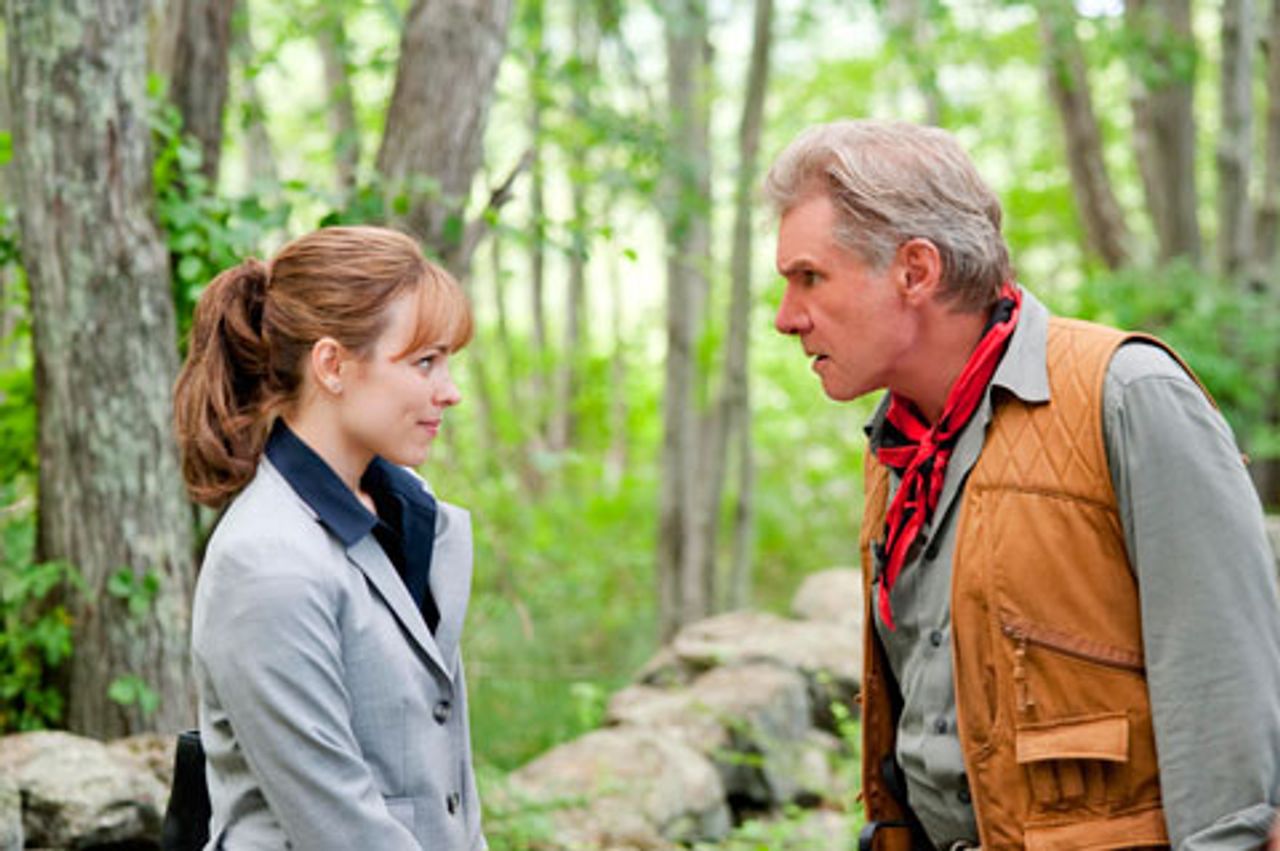Directed by Roger Michell, written by Aline Brosh McKenna
 Morning Glory
Morning GloryWhy do make people make films? Why do people go see them?
These questions come up in relation to Morning Glory, a film about the television business, directed by Roger Michell, because it seems such an essentially empty exercise. It is not the worst of the films currently showing, nor is there a lack of talent involved in its production, but the movie seems to have been created without any hope or desire that it might have a meaningful, enduring impact on anyone. Such “modesty” deserves to be recognized.
In the film, Rachel McAdams plays a lively, ambitious young television producer, Becky Fuller, who works for an early morning program in suburban New Jersey. Unexpectedly and undeservedly fired from that job, she lands another with a national morning program, “Daybreak” (on a fictional television network, IBS), currently at the bottom of the ratings heap.
Given a limited amount of time by her superior at the network (Jeff Goldblum) in which to turn the situation around, Becky comes up with the idea of pairing veteran “legendary” newsman Mike Pomeroy (Harrison Ford) with the show’s longtime and temperamental co-host, Colleen Peck (Diane Keaton).
Pomeroy disdains morning television as unworthy of a serious newsman, but his contract with IBS obliges him, under certain conditions, to take any position offered by the network. Grudgingly and uncooperatively, he comes to work at “Daybreak.” He feuds with Peck, refuses to cover any story he considers unserious and generally makes life hell for Becky. In one angry exchange, Pomeroy accuses the young woman of belonging to the “cabal” destroying television news. She replies, “The world has been debating news versus entertainment for years, and guess what, Mike? Your side lost.”
In the end, of course, each of them bends a little. Becky learns the value of serious investigative reporting, while Pomeroy comes to understand that “populist” efforts need to be made to gain viewers.
A romance between Becky and another IBS producer (Patrick Wilson) seems largely thrown in as an afterthought. A particularly unconvincing conceit of the film is that McAdams’ character—as endearing and attractive as the filmmakers can render her—is too obsessed with her job and too inept at the mechanics of relationships ever to win someone’s heart. On the other hand, Becky is expected—and everything about her calculatingly designed—to win over the spectator’s in the film’s opening seconds.
There are many things wrong with Morning Glory, starting with its banal and conformist cultural-social assumptions. Screenwriter Aline Brosh McKenna is credited with writing The Devil Wears Prada (2006), a slick adaptation to wealth and celebrity. The new film accepts the current wretched state of television news and entertainment more or less as an unalterable fact of life. Becky’s aforementioned line is uttered without the slightest irony or criticism.
In any case, the portrait of the Dan Rather-like Pomeroy as an icon of journalistic integrity and probity is also absurd. There are no such figures in the compromised and dishonest world of American television journalism. The cultural level at which Morning Glory is operating can be gauged by its elevation of NBC’s “The Today Show” to the pantheon of television excellence which every other program or individual in the field can only aspire to enter.
Michell’s film relies a great deal on McAdams’ charms. Given a bland and predictable script, the performer is obliged to supply too much of her own energy and too many mannerisms. She is appealing, but energy and playing at winsome awkwardness only go so far.
In general, Morning Glory pretends too much. The filmmakers pretend to care about the state of television journalism. The actors pretend that their parts are not familiar and clichéd. They pretend their characters have relationships with one another. Everyone involved pretends this has something to do with life.
Born in South Africa in 1956, Roger Michell began working in the British theatre in the late 1970s, at the renowned Royal Court Theatre in London. From 1985, he worked at the Royal Shakespeare Company for six years, where he eventually became a resident director. His intelligent and sensitive version of Jane Austen’s Persuasion (1995), made for the BBC, created a favorable impression.
Michell eventually directed Notting Hill (1999), written by Richard Curtis (Four Weddings and a Funeral, Love Actually, etc.), which was a great commercial success. He has also directed some work by writer Hanif Kureishi (The Mother and Venus) and an eclectic assortment of other films, including Changing Lanes (2002) and Enduring Love (2004). It is hard to discern a major theme or concern in Michell’s workmanlike, impersonal efforts. He inherited the Kureishi franchise at least temporarily from Stephen Frears, but the latter, while equally eclectic, directs for the most part with considerably more purposefulness.
Complacency is the guiding principle of Morning Glory. It might be an idea, instead of watching this, to locate a copy, for example, of Michael Curtiz’s The Breaking Point (1950) with John Garfield, Phyllis Thaxter, Patricia Neal and Wallace Ford, in all its heartbreaking urgency.
